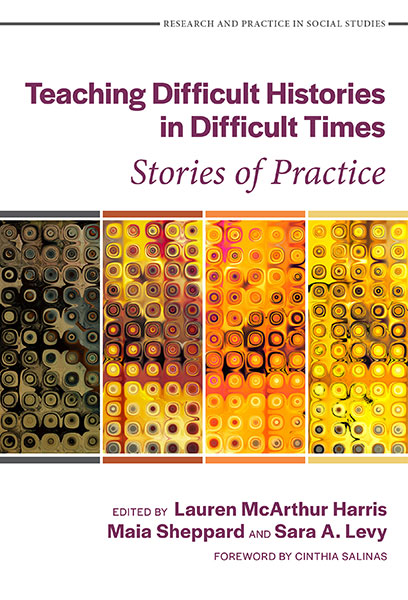Professors: Request an Exam Copy
Print copies available for US orders only. For orders outside the US, see our international distributors.
Edited by: Lauren McArthur Harris, Maia Sheppard, Sara A. Levy
Foreword by: Cinthia Salinas
Publication Date: February 11, 2022
Pages: 224
Series: Research and Practice in Social Studies Series

Winner of the Society of Professors of Education 2024 Outstanding Book Award
Despite limitations and challenges, teaching about difficult histories is an essential aspect of social studies courses and units across grade levels. This practical resource highlights stories of K–12 practitioners who have critically examined and reflected on their experiences with planning and teaching histories identified as difficult. Featuring the voices of teacher educators, classroom teachers, and museum educators, these stories provide readers with rare examples of how to plan for, teach, and reflect on difficult histories. The book is divided into four main sections: Centering Difficult History Content, Centering Teacher and Student Identities, Centering Local and Community Contexts, and Centering Teacher Decision-making. Key topics include teaching about genocide, slavery, immigration, war, racial violence, and terrorism. This dynamic book highlights the practitioner’s perspective to reveal how teachers can and do think critically about their motivations and the methods they use to engage students in rigorous, complex, and appropriate studies of the past.
Book Features:
Lauren McArthur Harris is an associate professor of history education at Arizona State University. Maia Sheppard is an assistant professor and coordinator of social studies education at the University of Iowa. Sara A. Levy is an associate professor of education at Ithaca College.
“Overall, this book is an important read for prospective and practicing teachers and teacher educators, administrators, researchers, and policymakers who are willing to confront the challenges of teaching difficult histories. It offers an inspiring and promising set of tools that social studies and history educators and scholars can use to tackle this challenging process.”
—Teachers College Record
“The details that are revealed in this volume create a visceral experience for readers—a chance to peek into a teacher’s thinking and rethinking, and to hear the voices of students and their families….If we can follow the lead of educators included in this compilation, there is hope.”
—From the Foreword by Cinthia Salinas, Ruben E. Hinojosa Regents Professor in Education, The University of Texas at Austin
“I strongly recommend this book to any educator who is interested in better understanding what constitutes ‘difficult histories,’ why it is so important to teach such histories, and what the challenges are when doing so. The rich and engaging examples of practice that permeate this book provide examples of what good teaching of difficult histories looks like in various contexts.”
—Diana E. Hess, dean and Karen A. Falk Distinguished Chair of Education, University of Wisconsin-Madison
Contents
Foreword Cinthia Salinas ix
Introduction: Framing Difficult Histories 1
Lauren McArthur Harris, Maia Sheppard, and Sara A. Levy
PART I: CENTERING DIFFICULT HISTORY CONTENT 13
1. Representing Difficult History Through Images and Narratives With Museum Partners: Learning and Teaching at the 9/11 Memorial & Museum 15
Rebecca L. Rosen, Kevin W. Meuwissen, Megan C. Jones, and Jennifer M. Lagasse
2. Rethinking the Teaching of Black History: Teachers, Students, and the Development of a Black History and Literature Course Using a Black Historical Consciousness Framework 28
Gregory Simmons, LaGarrett J. King, and Mary Adu-Gyamfi
3. Teaching About the Nanjing Safety Zone to Introduce Human Rights 41
Jing A. Williams, Christian D. Pirlet, and Mary Johnson
PART II: CENTERING TEACHER AND STUDENT IDENTITIES 53
4. “Step by Courageous Step”: A Preservice Teacher’s Understanding of the Story of Ona Judge 55
Amanda E. Vickery, Shalicia Hobby, and Marquita Foster
5. Pacific Learners, Identity, and Difficult Histories: A New Zealand Case Study 68
Bronwyn Houliston
6. Perpetual War as Difficult History: Teaching Against Militarism and for Peace 80
Scott T. Glew
7. Teaching the Holocaust: A Search for Its Redemptive Value 90
Doran Katz
PART III: CENTERING LOCAL AND COMMUNITY CONTEXTS 103
8. From Praying Towns to the National Day of Mourning: Centering Indigenous Peoples’ Survivance and Resistance Within American History 105
Taylor Collins and Christopher C. Martell
9. “When People Stay Silent, It Looks Like Newberry Is the Only One With This Problem”: Confronting the Difficult History of Racial Violence in an African American History Course 117
Elizabeth Yeager Washington, Catherine G. Atria, Jordan Marlowe, and Christina Aulino
10. Comparing Historical Injustices: The Possibilities and Challenges of Teaching Multiple Injustices From an Anticolonial Perspective 129
James Miles and Rosie Thind
11. The Paradoxical Qualities of Teaching Difficult History 142
Tyler Moon and H. James (Jim) Garrett
PART IV: CENTERING TEACHER DECISION-MAKING 153
12. “The 13th Amendment, It Don’t Say That We Kings”: Teaching the History of Mass Incarceration and Criminal Justice Reform Through Hip-Hop Pedagogy 155
Kelly R. Allen
13. Teaching Difficult Histories of Immigration at the Elementary Level 167
Tara Rich and Sohyun An
14. “If You’re Not Talking About Those Things, You’re Not Talking About History”: Interrogating and Discussing Secondary Sources 179
Lance Weisend, Colleen Fitzpatrick, and Stephanie van Hover
15. “These Are Human Beings We’re Talking About”: 9th Graders Think and Write About the Middle Passage 191
Jennifer Hauver, Victoria Lisle, and Ga-Min Lee
About the Contributors 204
Index 206
Professors: Request an Exam Copy
Print copies available for US orders only. For orders outside the US, see our international distributors.